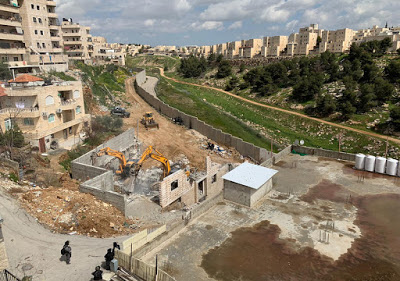UN treats Israeli army as peacebuilding partner
 |
| Maureen Clare Murphy 7 October 2019 |
The tunnel vision of United Nations officials committed to a two-state solution at the expense of basic human rights principles is downright dangerous.
A UN “peacebuilding” official stated on Sunday that she had “good meetings today with Israeli interlocutors” including the military and foreign ministry.
The UN official, Rosemary DiCarlo, said that “pressing peace and security challenges” were discussed in the meetings. “Resuming the peace process is critical for resolving the Israeli-Palestinian conflict,” she added.
It would seem that for DiCarlo’s Department of Political and Peacebuilding Affairs, peace should come at the cost of justice.
The Israeli military has killed more than 200 protesters demanding their rights in Gaza since early 2018. Treating this brutally repressive body as a partner for peace undermines the urgent need for accountability for Israel’s crimes in Gaza and beyond.
Earlier this year, an independent UN commission of inquiry concluded that Israeli forces may have committed war crimes and crimes against humanity by using lethal military force against unarmed protesters in Gaza.
The human rights investigators called on third states to hold Israeli army snipers and commanders, as well as those who approved the rules of engagement, to account.
Toward that end, the commission handed over a file identifying those responsible for violations of international law to the UN High Commissioner for Human Rights so that it would be transferred to the International Criminal Court.
By meeting with military officials, and the ministry concerned with shielding Israel from accountability, while treating them as partners for peace, DiCarlo is directly undermining the UN commission of inquiry’s findings and recommendations.
Two-state solution trumps human rights
For some high-ranking UN officials, the moribund “peace process” towards a two-state solution is more important than advancing and protecting Palestinians’ human rights.
On Monday, the UN’s Middle East peace envoy tweeted a photo of him and DiCarlo meeting with a group of students in Ramallah, the seat of the Palestinian Authority in the occupied West Bank.
The students attend a school operated by UNRWA, the UN agency for Palestine refugees.
“I hope these young girls grow up to participate in #democratic elections where #Palestine, #Israel live side-by-side in #peace & #security,” Nickolay Mladenov, the UN envoy, stated.
His tweet implies that the girls in his photo should remain refugees as adults. He does not wish for them to be able to exercise their right to return, as is their right under international law, nor their right to self-determination.
Instead, he wishes for a political framework that would likely prevent them from exercising these rights.
While DiCarlo, and presumably Mladenov, were meeting with Israeli military and foreign ministry officials on Sunday, Israel’s interior ministry announced that it was moving to revoke residency status from and deport Palestinian activist Omar Barghouti.
For years Israel has sought to criminalize and silence Barghouti, who is a founder of the boycott, divestment and sanctions (BDS) movement.
Modeled on the successful campaign to end apartheid in South Africa, the Palestinian-led boycott movement seeks to build international pressure on Israel to stop its human rights violations.
Israeli foreign minister Yisrael Katz has previously called for “targeted civil eliminations” of BDS leaders with the help of Israeli intelligence. The Hebrew term Katz used was similar to the Israeli term for “targeted assassinations.”
UN officials like DiCarlo and Mladenov treat the very ministries persecuting Palestinian human rights defenders as partners for peace.
Safeguarding Israeli impunity
Meanwhile, the UN High Commissioner for Human Rights continues to delay the release of a database of companies complicit with Israel’s illegal settlements in the West Bank.
In 2016, the UN Human Rights Council adopted a resolution requesting that the high commissioner “produce a database of all business enterprises engaged in certain Israeli settlement activity.”
The high commissioner has failed to fulfill that mandate.
Last week, Palestinian and international human rights organizations stated that the high commissioner’s “repeated delays in releasing the database and transmitting the data promote impunity and enable further entrenchment and expansion of illegal settlements.”
UN officials behave as though their role is to safeguard Israeli impunity, rather than to uphold the rights of Palestinians, denied for so long.


